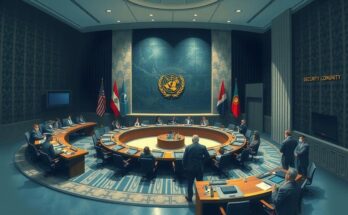The civil war in Sudan has escalated significantly with military advancements against the RSF, leading to a humanitarian crisis. Despite gains in Khartoum, the war may evolve into a battleground for rival administrations. The RSF’s establishment of a parallel government complicates the conflict, indicating a dangerous potential for further partitioning of the nation and exacerbation of human rights abuses.
The ongoing civil war in Sudan has reached a critical stage nearly two years after its commencement in April 2023. The conflict has resulted in tens of thousands of casualties, displacing millions and contributing to widespread famine. The Sudanese military has achieved noteworthy advances against the paramilitary Rapid Support Forces (RSF), claiming control over the capital, Khartoum, including the significant Republican Palace, although the RSF has not confirmed these losses.
The conflict began when the military and RSF, initially allies during a democratic transition attempt following a 2019 uprising, turned against one another, leading to violent power struggles. Since the onset of hostilities, at least 28,000 individuals have lost their lives, with many more unaccounted for, and over 14 million displaced as famine looms in numerous regions.
While the military’s recent victories indicate a shift in the war’s narrative, it may create a de facto partition of Sudan, dividing it into military-controlled and RSF-controlled territories. Military chief General Abdel-Fattah Burhan has shown reluctance to pursue fruitful peace negotiations, while RSF leader General Mohamed Hamdan Dagalo appears committed to continuing the fight. The RSF maintains significant control in western Sudan, particularly in the Darfur area.
The recent establishment of a ‘parallel government’ by the RSF and its allies signifies growing complexities in the conflict. In February, they signed a charter in Nairobi to formalize this governance structure, while Burhan hinted at a transitional government. This could foster rivalry between two administrations, further solidifying Sudan’s partition.
The RSF’s charter promotes a vision for a “secular, democratic and decentralized state,” addressing the aspirations of various communities within Sudan seeking autonomy. The RSF emerged from the infamous Janjaweed militias, notorious for their violence in Darfur. The current conflict has seen the RSF accused of numerous human rights violations, leading to sanctions from the Biden administration against Dagalo for alleged genocide, a claim the RSF has denied. Simultaneously, the military is also facing accusations of abuses, which they refute.
In summary, the civil war in Sudan continues to escalate with significant implications for its political landscape and humanitarian situation. The military’s recent advances create a potential division of the country, as both opposing forces, the military and the RSF, remain entrenched in conflict. The formation of a parallel government by the RSF complicates the prospects for peace, highlighting critical underlying tensions that could further entrench the divide within Sudan as the humanitarian crisis deepens.
Original Source: www.newsday.com




